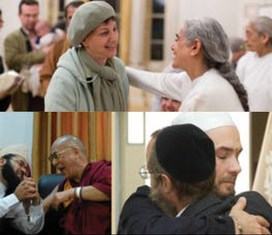
If I understand it correctly the ‘other’ is at the heart of Levinas’ philosophy. For Levinas a person is more than any description or idea that we might have of them. Nothing can fully describe the other. To reduce a person to my idea of them is to deny them real autonomy and is in fact a violent act because it encourages me to claim what the other is about even before they have spoken. We have to allow the other to be other, to be different and it is this recognition of otherness that not only allows us to relate to them but to experience God through them. This experience of otherness is for Levinas the basis of ethics. Personal relationships are an exploration of the other whom we can never totally know. The other is a mystery whose mystery and difference is always to be respected.
It reminded me of Thomas Merton‘s saying “A person is a person in so far as each has a secret and is a solitude of their own that cannot be communicated to anyone else……..a love that breaks into the spiritual privacy of another does not love them: it seeks to destroy what is best in them and what is most intimately theirs.” And the corollary of this is to care for and take responsibility for the wellbeing of the other.
It’s very obvious that this is exactly what the Nazis didn’t do – they judged and reduced the Jewish community to something less than human, they refused to allow the Jews and others to be themselves and to respect their difference. With his experience of Nazi persecution and the horrors of the Holocaust it’s understandable that Levinas should put the other at the heart of his philosophy. And the Nazis were not the only ones to dehumanise others. One of the characteristics of genocides is to use the kind of language that equates a group with animals, vermin, insects or disease. And the human race has seen more than its fair share of genocides. We never learn. Even in a milder form any kind of hate speech and racism, whether it be anti-Jewish or anti- Islamic, is dehumanising and violent.
Levinas’ focus is on the other and his recognition of the sacredness of the other is profound and important but there is also a sense in which we are the same. The idea of other can be distorted and exaggerated to divide people into ‘ them’ and ‘us ‘which set us apart from one another. We are different but we do all share the same human nature; we belong to the same human race; we are interconnected and interrelated. The Golden Rule tells us to love our neighbour as ourselves and Buddhism reminds us that this is true because our neighbour is ourselves. To harm another is to harm ourselves. Differences, while they are to be respected and honoured, are also superficial.
The point of the Levinas colloquium, organised as it was by our Committee for Interreligious Dialogue, was to help us reflect on the impact Levinas could have on interreligious dialogue. It’s obvious I think. To recognise the differences in faiths, to allow them to be themselves, to recognise that they are different and that perhaps it’s impossible to truly enter into their psyche, to recognise that in their differences they have a wisdom and message for all of us. But members of other faiths are human beings seeking a meaningful way of life for themselves and the world. While it’s important to recognise their otherness it’s also true that we can learn to understand them, dialogue with them and break down any barriers that set us apart. We can try to learn their language and understand the world from their perspective. To enter into the world of another is to tread on sacred ground and to dialogue with them is a sacred act. Levinas reminds us of this


 RSS Feed
RSS Feed
